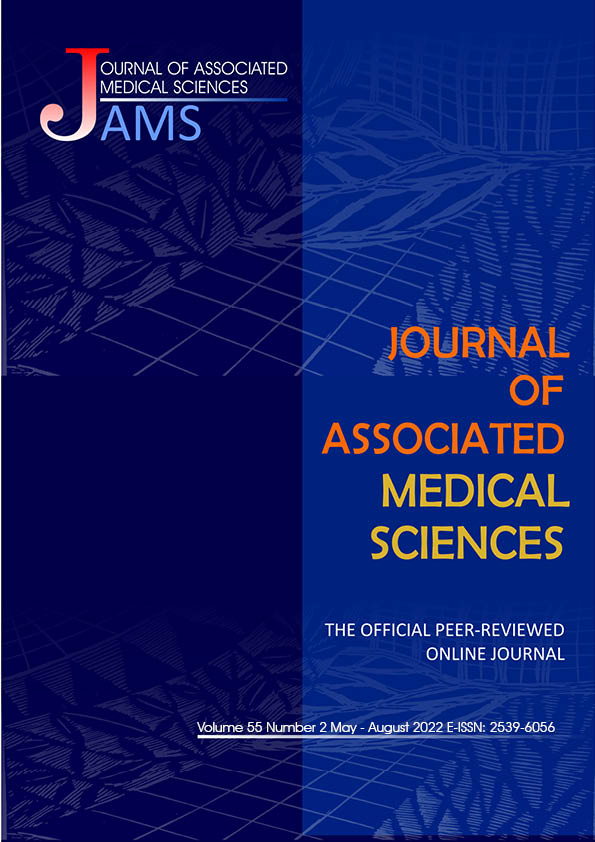Cognitive assessment and intervention in occupational therapy for Thai older adults with neurocognitive disorders
Main Article Content
Abstract
Background: Occupational therapists (OTs) have a significant role in maintaining clients' well-being. Understanding the current occupational therapy (OT) practice for the elderly with neurocognitive disorders (NCDs) brings effective service.
Objectives: This study aimed to explore current OT practice for cognitive assessment and intervention for the elderly with NCDs in Thailand.
Materials and methods: This study explored OT practices via questionnaire. Questionnaires were distributed to one hundred and ninety-one OTs throughout Thailand.
Results: One hundred and fifty-two occupational therapists (79.87%) responded to the survey. Most worked full-time (94.08%), and 74.34% worked at general hospitals. Participants were more likely to employ standardized cognitive tests (45.33%) than non-standardized assessments (38.00%). Typical standardized tests were screening tests rather than comprehensive tests. The most reported cognitive problem was basic cognition (77.63% to 98.08%). The main cognitive intervention focused on basic cognition (80.92% to 94.74%). Typical interventions were caregiver education (83.89%), physical activity (73.15%), and perceptual retaining (68.46%). Challenges to OT intervention were therapists had poor evaluation skills, unclear intervention guidelines, and an insufficient number of therapists.
Conclusion: OTs should participate in further education and develop a guideline and appropriate comprehensive cognitive assessment tools.
Article Details

This work is licensed under a Creative Commons Attribution-NonCommercial-NoDerivatives 4.0 International License.
Personal views expressed by the contributors in their articles are not necessarily those of the Journal of Associated Medical Sciences, Faculty of Associated Medical Sciences, Chiang Mai University.
References
United Nations, Department of Economic and Social Affairs, Population Division. Comprehensive tables. New York: United Nations; 2019.
Sabayan B, Sorond F. Reducing risk of dementia in older age. JAMA. 2017; 317(19): 2028. doi:10.1001/jama.2017.2247.
Foundation of Thai Gerontology Research and Development Institute. Situation of the Thai elderly 2016. Bangkok: Printery; 2017.
American Psychiatric Association. Diagnostic and Statistical Manual of Mental Disorders: DSM-5. Washington, DC: American Psychiatric Publishing; 2013.
Murman DL. The impact of age on cognition. Semin Hear. 2015; 36(3): 111-21. doi: 10.1055/s-0035-1555115.
Teng E, Tassniyom K, Lu PH. Reduced quality of life ratings in mild cognitive impairment: analyses of subject and informant responses. Am J Geriatr Psychiatry. 2012; 20(12): 1016-25. doi: 10.1097/JGP.0b013e31826ce640.
O’Sullivan G, Hocking C. Translating action research into practice: Seeking occupational justice for people with dementia. OTJR: Occupation, Participation and Health. 2013; 33(3): 168-76. doi: 10.3928/15394492-20130614-05.
American Occupational Therapy Association. Standards of practice for occupational therapy. Am J Occup Ther. 2015; 69 (Suppl. 3). doi: 10.5014/ajot.2015.696S06.
O'Brien JC, Hussey SM, Sabonis-Chafee B. Introduction to occupational therapy. 4th ed. Missouri: Elsevier Mosby; 2012.
Bennett S, Shand S, Liddle K. Occupational therapy practice in Australia with people with dementia: A profile in need of change. Aust Occup Ther J. 2011; 58(3): 155-63. doi: 10.1111/j.1440-1630.2011.00930.x.
McGrath M, O’Callaghan C. Occupational therapy and dementia care: A survey of practice in the Republic of Ireland. Aust Occup Ther J. 2014; 61: 92-101. doi: 10.1111/1440-1630.12081.
Belchior P, Korner-Bitensky N, Holmes M, Robert A. Identification and assessment of functional performance in mild cognitive impairment: A survey of occupational therapy practices. Aust Occup Ther J. 2015; 62: 187-96. doi: 10.1111/1440-1630.12201.
Department of Older Persons. Guideline for elderly health service for health service center; 2009. [cited 2021 Dec 31]. Available from: http://agingthai.dms.go.th/agingthai/wp-content/uploads/2021/01/book_5.pdf (in Thai).
Office of the Permanent Secretary. Organization structure in provincial administration. (in Thai). 2017 [updated 2017 Jun 14; cited 31 Dec 2021]. Available from: http://www.klongyaihospital.net/koy/doc/structure_001.pdf.
Connolly S, Gillespie P, O'Shea E, Cahill S, Pierce M. Estimating the economic and social costs of dementia in Ireland. Dementia (London, England). 2014; 13(1): 5-22. doi: 10.1177/1471301212442453.
Gately ME, Trudeau SA. Occupational therapy and advanced dementia: A practitioner survey. J Geriatr Ment Health. 2017; 4(1): 48-53. Doi: 10.4103/jgmh.jgmh_41_16.
Grand JH, Caspar S, MacDonald S. Clinical features and multidisciplinary approaches to dementia care. J Multidiscip Healthc. 2011; 4: 125-47. doi: 10.2147/JMDH.S17773.
De Roeck EE, De Deyn PP, Dierckx E, Engelborghs S. Brief cognitive screening instruments for early detection of Alzheimer's disease: a systematic review. Alzheimers Res Ther. 2019; 11(1): 21. doi: 10.1186/s13195-019-0474-3.
Roebuck-Spencer TM, Glen T, Puente AE, Denney RL, Ruff RM, Hostetter G, et al. Cognitive screening tests versus comprehensive neuropsychological test batteries: A national academy of neuropsychology education paper. Arch Clin Neuropsychol. 2017; 32(4): 491-8. doi: 10.1093/arclin/acx021.
Munkhetvit P. Manual of Thai Cognitive-Perception Test (Thai-CPT): Otto Bock South East Asia; 2010.
Butler M, McCreedy E, Nelson VA, Desai P, Ratner E, Fink HA, et al. Does cognitive training prevent cognitive decline?: A systematic review. Ann Intern Med. 2018; 168(1): 63-8. doi: 10.7326/M17-1531.
Möllers T, Stocker H, Wei W, Perna L, Brenner H. Length of hospital stay and dementia: A systematic review of observational studies. Int J Geriatr Psychiatry. 2019; 34(1): 8-21. doi: 10.1002/gps.4993.
Banich MT, Compton RJ. Executive function and higher-order thinking. Cognitive Neuroscience. 4th ed. Cambridge: Cambridge University Press; 2018.
Panerai S, Tasca D, Musso S, Catania V, Ruggeri F, Raggi A, et al. Group intensive cognitive activation in patients with major or mild neurocognitive disorder. Front Behav Neurosci. 2016; 10: 34. doi:10.3389/fnbeh.2016.00034.
Haslam C, Cruwys T, Haslam SA. “The we's have it”: Evidence for the distinctive benefits of group engagement in enhancing cognitive health in aging. Soc Sci Med. 2014; 120: 57-66. doi: 10.1016/j.socscimed.2014.08.037.
Clare L, Woods RT. Cognitive training and cognitive rehabilitation for people with early-stage Alzheimer’s disease: a review. Neuropsychol Rehabil. 2004; 14(4): 385-401. doi: 10.1080/09602010443000074.
Allen HA, Roberts KL. Editorial: Perception and cognition: Interactions in the aging brain. Front Aging Neurosci. 2016; 8: 130. doi: 10.3389/fnagi.2016.00130.
Gheysen F, Poppe L, DeSmet A, Swinnen S, Cardon G, De Bourdeaudhuij I, et al. Physical activity to improve cognition in older adults: Can physical activity programs enriched with cognitive challenges enhance the effects? A systematic review and meta-analysis. Int J Behav Nutr Phys Act. 2018; 15(1): 63. doi: 10.1186/s12966-018-0697-x.


